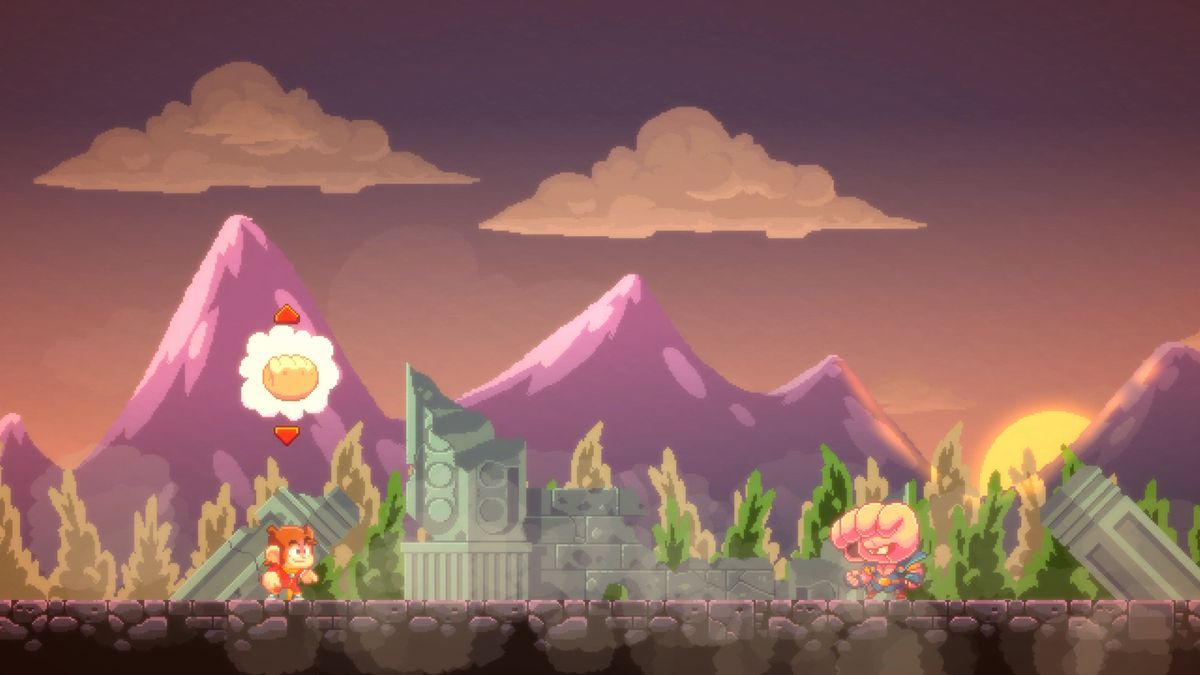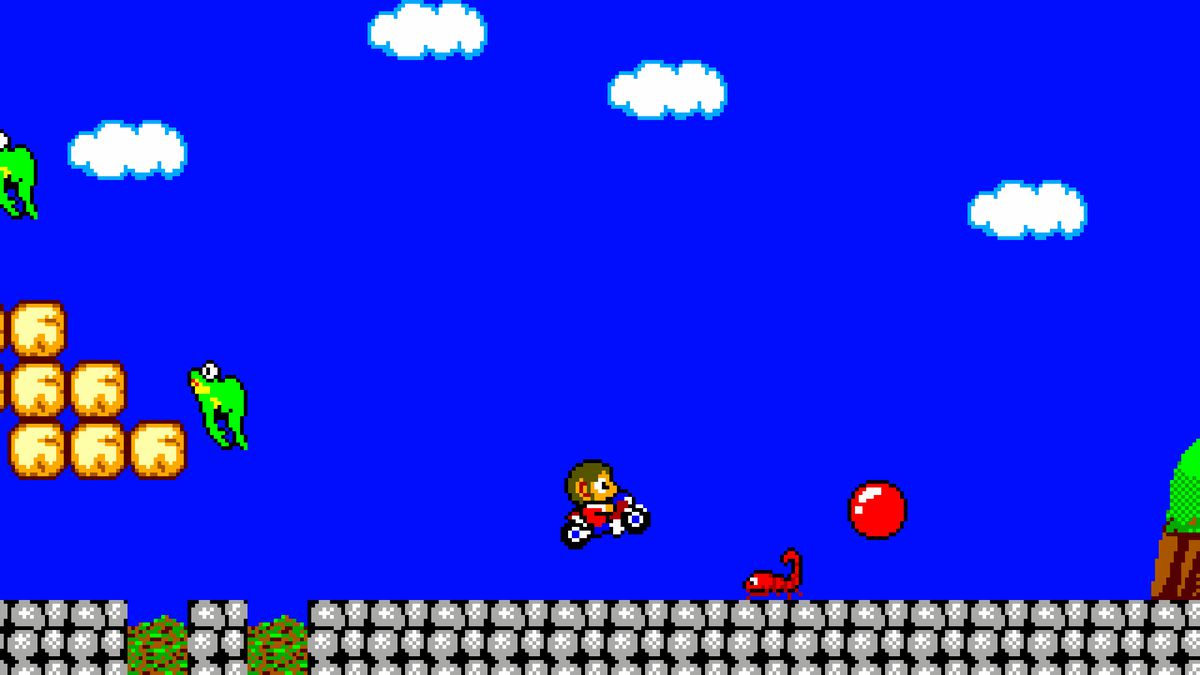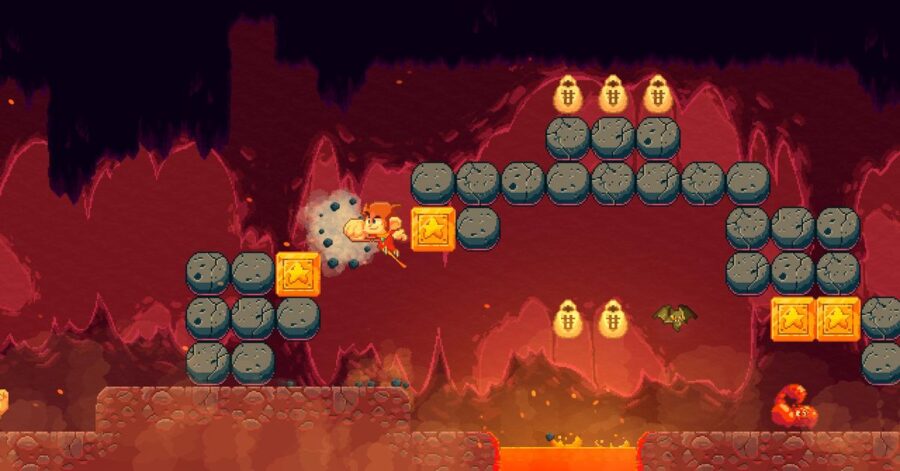The latest revival of a vintage Sega game that’s not made by Sega itself is Alex Kidd in Miracle World DX, a remaster of the 8-bit platformer that launched on the Sega Master System. Developed by Jankenteam and originally created as a fan project, the officially sanctioned remaster is a handsome visual update that does little else to modernize Alex Kidd’s 35-year-old adventure.
Alex Kidd in Miracle World DX plays nearly identically to its 1986 counterpart, largely for the worse. The developers, who clearly love Alex Kidd, have only slightly modified how Sega’s former mascot controls. Many of the changes are superficial or minor interface changes; it’s easier to use Alex’s power ups, for example.
Other changes seem designed simply for fun. In the original Japanese version of Alex Kidd in Miracle World, Alex chomps down on onigiri rice balls at the end of each level. That meal was changed to a hamburger for the Western release. DX takes it a step further, offering both onigiri and the burger as a “diet” option, as well as a Spanish omelette and fish and chips. It’s a cute detail, and it underscores Jankenteam’s affection for the short-lived franchise. (Alex starred in just six games, all released between 1986 and 1990.)

Elsewhere, things feel largely the same. Many boss battles are a contest of rock-paper-scissors (really!), while others involve dodging and punching your foes. Platforming and hand-to-monster combat feels clumsy.
It’s the visuals that make Alex Kidd in Miracle World DX shine. Alex, the Miracle World, and all of its inhabitants have been given a detailed, excessively animated makeover. The stiff-looking Alex of the Master System original now looks more like an energetic monkey-boy, just as the fist-headed bosses now look more like their Dragon Ball inspirations. In a nice little touch, Jankenteam lets you swap between the updated graphics and those of the original with a single button press, and the difference is dramatic every time.
But DX’s lovely graphics can’t make up for Alex Kidd in Miracle World’s ancient gameplay mechanics. Alex dies at the lightest of touches, and his floaty movement makes playing through much of Miracle World grueling. Fortunately, the option to switch on infinite lives is just a menu away, and I can’t imagine playing through the game again without that convenience.

This is truly a product of its time. Alex Kidd in Miracle World and other 8-bit games of the era were designed to be challenging, if not infuriatingly hard, so that players got maximum time out of games with smaller scope. Some players, like myself, may find it difficult to revisit that era of games. I was pleased to dispatch the big bad, Janken, and step away from Alex Kidd’s revival.
Alex Kidd in Miracle World DX is nearly as short of an experience as its 8-bit ancestor, but there are a few extras to see along the way. Completing the main game unlocks a Boss Rush mode — if you really want to flex your roshambo skills — and a Classic Mode. Curiously, that Classic Mode, which differs from the classic graphics option in the main game, is not a fully emulated version of the original Miracle World. It’s “the developer’s recreation inspired by the Sega Master System classic,” the game says. For something truly authentic, you’ll have to check out Sega and M2’s Sega Ages release of Alex Kidd in Miracle World for Nintendo Switch.
Alex Kidd in Miracle World DX released June 22 on Nintendo Switch, PlayStation 4, PlayStation 5, Xbox One, Xbox Series X, and Windows PC. The game was reviewed on PlayStation 5 using a pre-release download code (for PS4) provided by Merge Games. Vox Media has affiliate partnerships. These do not influence editorial content, though Vox Media may earn commissions for products purchased via affiliate links. You can find additional information about Polygon’s ethics policy here.
Polygon – All
Source link
Related Post:
- Alex Kidd in Miracle World DX is coming earlier than expected
- Alex Kidd in Miracle World DX Launching June 22
- Video: Alex Kidd in Miracle World DX trailer
- Alex Kidd In Miracle World DX Is Now Available For Digital Pre-order And Pre-download On Xbox One And Xbox Series X|S
- Alex Kidd In Miracle World DX Is Now Available For Xbox One And Xbox Series X|S
- Alex Kidd in Miracle World DX Gets Launch Trailer
- Alex Kidd in Miracle World DX is an Annoying, Slippery Platformer
- SEGA hosting August 2024 sale on the Switch eShop, some SEGA Ages games at lowest price yet
- Rumour: Red Dead Redemption Remaster Planned, But Could Depend on GTA Success
- Video: Are 2D Games Worth $60? Jon, Alex And Zion Share Their Own Thoughts
